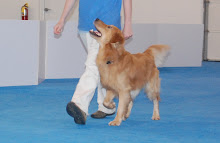1) A lot of practice is important.
2) Practicing the right things, and being efficient with practice, is important.
3) It's more about the right opportunities and practice than anyone being all that different or inherently exceptional.
4) It's important for challenges to be continually increased. The bar should always be set higher.
As I read, I think about this from different perspectives: for myself, for my dogs, for my students, for my students who are enthusiasts/in sports classes, for my 4-H kids, and for the many instructors that I know.
Myself: I know I've had a lot of practice. The short version is that I had a lot of practice early on, it wasn't great practice but it wasn't bad either. I had opportunities to work with many species and I've been obsessive about animals for my whole life. But I don't do as much practice as I used to. I make use of my time at the shelter to maintain and improve training skills. I continually work with my dogs. I am now much more efficient with my training sessions. In some ways I don't think I challenge myself enough (often taking the "easy route" in training), though my interest in various competition-type activities --does-- require me to continually work towards a high standard.
My Dogs: Griffin is 3.5. When Blaze was 3.5, he probably had 10-25x the training hours Griffin has had. Griffin is about a hundred times more proficient than Blaze. It's not just about Blaze's brain abnormality. I've had higher standards with Griffin. My greater experience has allowed us to be more efficient. We set out every training session with a specific goal (faster, straighter, closer, more still, higher, etc). With Blaze, it was about getting a lot of sits in a row. I can also see the dangers (and damage) that result from practicing poorly or practicing the wrong things.
My Human Students: There are a lot of times when we do exercises specifically to let the people get the practice. We do things again and again and again. In some ways, I don't like "wasting" the time, but they do need to get into the habit and not everyone will work at home. I am continually working to get the lessons to be more efficient, with more done in less time and to a higher degree of competency. I need to challenge this group more.
My Dog Students: It's hard having two learners. Sometimes the dog is holding back the learning of the person, and sometimes it's the other way around. Again, it's a balance of challenging the team but also allowing enough repetition and time for them to get comfortable and competent with the skills.
Enthusiast Students: They really like practicing. They don't always like (or think) to practice the stuff they should spend time on. Sometimes it's harder to get these teams to practice efficiently or with good technique/skill. They want to skip steps and shortcut. They can see the final picture but aren't always able to see what's required for each step in between. It's my job to challenge them at the right level and not let them get caught up in the big-picture goals. Some of these teams have been in dogs for a really long time. I'm often amazed at the poor training many people (students or not) have been able to get away with and still have success...and I don't mean punishment. Timing, setting criteria, reinforcement, training plans.
4-H Kids: This is a really interesting group. It's easy to get them to practice some things. Painfully hard to get them to see the importance of other things. We're on a limited time frame, meaning we shortcut some training steps or aren't competition-ready by competition day. But I do see many of them week after week for six or so months, every year for many years. It really gives me big-picture feedback on how our training plans are working. It also gets easy to fall into the patterns of doing the same activities again and again and not pushing that bar higher on a week to week basis.
Other Trainers: I know a lot of dog trainers (the internet is amazing). I have a lot of trainer friends. I have many in classes or that I see on a regular basis. I have some students who want to do teach. Without hesitation, I can say that I'm often rather concerned. There are many professionals who need to spend some time training animals (teaching is a different skill set) as well as expanding their teaching and training skills. Set the bar higher! Challenge! I feel a lot of responsibility to help my trainer-friends. It's easier when they ask for help. When they don't, it's a balance of finding ways that I can support or encourage them to keep working.






No comments:
Post a Comment